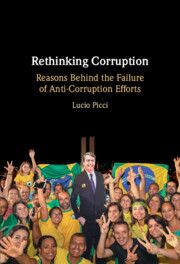Book contents
- Rethinking Corruption
- Rethinking Corruption
- Copyright page
- Dedication
- Contents
- Figures
- Preface
- Part I Laying the Groundwork
- 1 Introduction
- 2 The Consensus on Corruption
- 3 The Mutual Shaping of Measures and Concepts
- 4 Of Causality and Historical Junctures
- 5 What We Talk about When We Talk about Corruption
- Part II Three Case Studies
- Part III Rethinking Corruption
- References
- Index
1 - Introduction
from Part I - Laying the Groundwork
Published online by Cambridge University Press: 27 February 2024
- Rethinking Corruption
- Rethinking Corruption
- Copyright page
- Dedication
- Contents
- Figures
- Preface
- Part I Laying the Groundwork
- 1 Introduction
- 2 The Consensus on Corruption
- 3 The Mutual Shaping of Measures and Concepts
- 4 Of Causality and Historical Junctures
- 5 What We Talk about When We Talk about Corruption
- Part II Three Case Studies
- Part III Rethinking Corruption
- References
- Index
Summary
This chapter provides an introduction to the book. A focus on the social construction of corruption leads to the two main conclusions. First, corruption is a tool of government, because it offers reasons for elites to remain cohesive. These incentives may be in the form of both benefits and punishments. To the first type belong the enticements of corruption, and they are reinforced whenever the ruler has the possibility to assign at will the label “corrupt” and the ensuing punishments. This helps rulers solve a problem of control, which is a prerequisite for political order and a vital necessity of any political system. However, corruption as a tool of government has fundamental flaws. The second broad conclusion is that anti-corruption is a tool of politics, because it can be used to pursue a political agenda. Additionally, corruption is a tool of politics which is available more widely, because it is a powerful “valence issue,” that is, one of those issues on which most people agree, either negatively (as for corruption) or positively (as it would be, e.g., for “competence”). However, as a tool of politics anti-corruption has many shortcomings.
- Type
- Chapter
- Information
- Rethinking CorruptionReasons Behind the Failure of Anti-Corruption Efforts, pp. 3 - 15Publisher: Cambridge University PressPrint publication year: 2024

